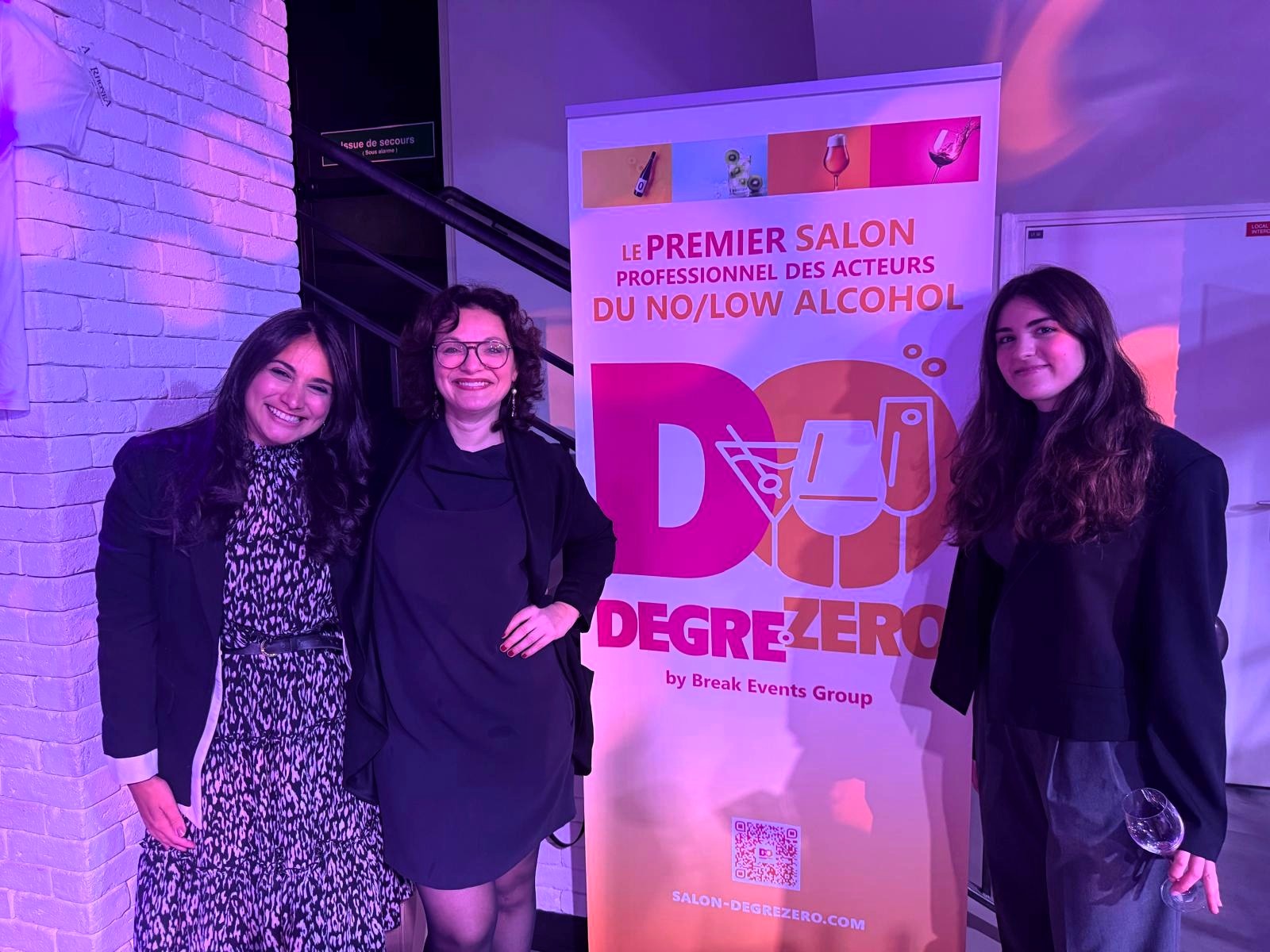
The Rise of Alcohol-Free Wine: A New Way to Socialize?
Renowned Master of Wine Liz Thach states: “As a wine lover, if alcohol-free wine is the only way to save our beloved vineyards, then I believe it’s a viable option.”
This past February, Yolanda Martínez, Project Manager at Exitalia, attended Degré Zero, an event organized by Break Events and held in Paris, exclusively dedicated to non-alcoholic wines and beverages. With 63 exhibitors from various countries (mostly France), the event highlighted the growing consumer interest in this category. What once seemed like a passing trend has now become a rapidly growing movement in the global market.
Declining Alcohol Consumption Among Younger Generations
One of the key drivers behind the growth of alcohol-free wine is the shift in consumption habits among younger generations. A 2018 study by Berenberg Research revealed that Generation Z (born between 1996 and 2012) consumes 20% less alcohol per capita than Millennials did at their age. Furthermore, 64% of respondents said they expect to drink less as adults than previous generations.
These findings are supported by surveys such as Gallup’s in the U.S., which reported that only 38% of young adults aged 18-34 consider themselves regular drinkers. This sobriety trend reflects not only health concerns but also cultural and social factors. The cultural diversity of Generation Z, particularly in the U.S. and many European countries, influences how they relate to alcohol. Religious, cultural, and family values play a significant role in this consumption decline.
A Market in Full Expansion
The growing interest in alcohol-free wine has drawn in notable producers.
For instance, Codorníu has been producing alcohol-free sparkling wine for over nine years and recently expanded its range to include still white and red wines. Familia Torres, a pioneer in this segment in Spain, launched its journey in 2008 with “Natureo White,” which has since expanded to include reds, rosés, and sparkling options.
Companies like Zeno, which produces wines in Castilla-La Mancha, have successfully positioned themselves in markets such as the UK. In Bordeaux, Les Vignerons Réunis de Monsegur launched its EdmOndBarbe 0% sparkling wine to meet demand in regions where alcohol consumption is culturally or religiously limited.
Innovative strategies are also paving the way: the brand Cypher has found success in North America with its canned format, while Château La Coste has invested in its premium alcohol-free line Nooh, focused on sparkling wines.
Even in the exclusive world of champagne, prestigious brands like Taittinger and French Bloom have released high-end alcohol-free versions, with prices reaching up to $100 per bottle. This confirms that alcohol-free wine can also position itself as a luxury product.
Challenges for Traditional Wineries
Despite the growing optimism around this category, many wineries remain hesitant. Producing alcohol-free wine requires significant investment in technology and a mindset shift within the industry. For smaller wineries with tight margins, this transition can seem more like a challenge than an opportunity.
Technological advancements have greatly improved the quality of alcohol-free wine, making production more viable. Methods like cold dealcoholization and technologies such as BevZero’s Clear Ale allow for better preservation of aromas and structure, reducing the need for added sugar to compensate for flavor loss. As technology progresses, production costs tend to decrease, making this category more accessible.
The Potential of Premium 0% Alcohol Brands
“Dealcoholization definitely represents an opportunity for Bordeaux producers,” says Anne-Sophie Sobecki, Head of Marketing and Communications at Bordeaux Families. “We can’t keep producing Bordeaux red wine if there’s no demand. Dealcoholization is a great way to diversify and tap into a growing market with strong premium potential.”
A standout example of this premium potential is French Bloom, whose top cuvée is priced at $119. Its rapid success, doubling sales each year since its 2021 launch, led Moët Hennessy to acquire a minority stake in 2023.
According to co-founder Maggie Frerejean-Taittinger, the goal is to reach consumers who, for various reasons, don’t want or can’t consume alcohol. “I wanted to create a sparkling wine that met the highest standards: 0.0% ABV, organic, sulfite-free, no added sugar or preservatives, ensuring purity and a focus on wellness,” she explains.
As a result, more wineries are expected to invest in alcohol-free wine production, expanding the offering and improving product quality in the coming years.
The Future of Alcohol-Free Wine
Alcohol-free wine is no longer viewed as a passing fad but rather as a trend redefining consumption habits in Spain and transforming the wine industry. Far from replacing traditional wine, this alternative serves as a complementary option for those who want to enjoy a glass without the effects of alcohol. Situations like driving, taking medication, or simply choosing to avoid alcohol make this type of wine an ideal solution.
Renowned Master of Wine Liz Thach states: “As a wine lover, if alcohol-free wine is the only way to save our beloved vineyards, then I believe it’s a viable option.”
This statement echoes the sentiment of many experts who see alcohol-free wine as an opportunity, not a threat. The real challenge for the industry appears to be adapting to new consumer preferences instead of expecting consumers to adjust to what wineries have traditionally offered.
The beer sector has already succeeded in integrating non-alcoholic versions into daily life in Spain, making them a common choice in bars and social gatherings. Will the same happen with wine?
The Spanish wine industry faces a crucial decision: will it embrace this new category as a growth opportunity or dismiss it as a threat? At a time when global wine consumption is declining, this alternative could be key to revitalizing the sector.
Spain, with the largest vineyard area in the world and the second-largest wine producer, must reflect on this shift. Moreover, a significant part of our economy depends on this industry.
What do you think? Is alcohol-free wine destined to become part of our wine culture?
Yolanda Martínez García
Project Manager, Exitalia International Consulting


